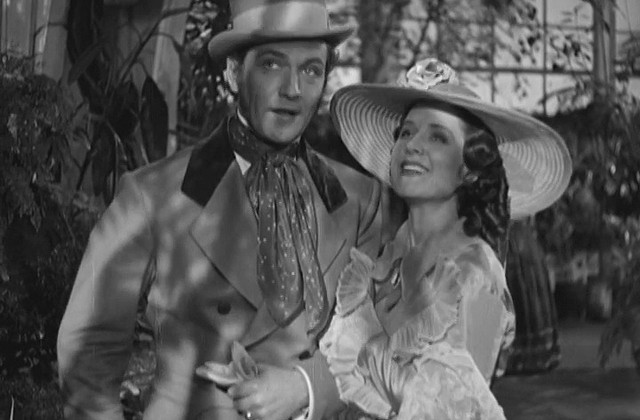Is there a greater love story than The Barretts of Wimpole Street?
Clacked by Kim Tibbs on Thursday, May 22, 2014 · Leave a Comment

When Elizabeth Barrett and Robert Browning fall in love in ‘The Barretts of Wimpole Street,’ will Elizabeth’s tyrannical father stand in the way of true love or will there be some poetic justice for the lovebirds? Find out in today’s Throwback Thursday.
The Warner Archive Collection graciously sent me a copy of The Barretts of Wimpole Street to review. The tagline proclaimed, “When poets love, Heaven and Earth fall back to watch!” Naturally, my romantic curiosity was piqued. To find out it was the love story of poets Elizabeth Barrett and Robert Browning further enthralled me.
I must say when I put the DVD in, it was a little sleepy to start. Maybe putting in an old black-and-white film from 1934 past 10:00 on a week night when you’ve been doing overtime wasn’t the best choice. No, that’s not really fair. I adore old black-and-white films. But this one didn’t immediately grab my interest. I fairly came close to giving up on it, but the moment the dashing Robert Browning entered the picture to visit Elizabeth, I knew I was hooked and I no longer cared about the lateness of the hour.
Starring the beautiful Norma Shearer as Elizabeth Barrett, Frederic March as Robert Browning, Charles Laughton as Elizabeth’s tyrannical father Edward Moulton-Barrett, and Maureen O’Sullivan as her rambunctious sister Henrietta, The Barretts of Wimpole Street tells the story of the Barrett family and how the patriarch rules his roost with an iron fist. Elizabeth’s father makes Captain von Trapp in The Sound of Music look like a pansy in comparison. Edward Moulton-Barrett is strict, fervently devoted in his faith and has forbidden any of his clan from marrying or falling in love – all because he has been miserable since his wife’s death. The viewer (and his children) isn’t sure whether you should hate him or pity him, and there are decidedly times you experience strong doses of both feelings.
Although she is young, beautiful and remarkably bright, Elizabeth leads the lonely life of an invalid confined to her room, forced to look out the window at the moon while she cries herself to sleep at night because she can’t escape her dreary world. Her father is always fussing about her condition and not allowing her to have any fun because it might upset her and make her condition worse. Even when the doctors note that she is perceptibly improving and they recommend she leave London’s harsh winter for the more favorable climate of Italy, her father refuses to let her leave. I questioned how old Elizabeth was that she was so afraid of her father and his disapproval, but maybe it truly was a different time period. An 1840s London was a time when men were gentlemen and women were ladies and people seemed to have more dictated behaviors. I suppose back then an invalid child of affluence probably would do whatever her father said without daring to speak back. I simply could not bite my tongue that much, especially where my health and love life were concerned.
It’s while she’s confined to her room that she develops a love for writing and reading poetry, publishing several volumes, as well as taking up a correspondence with the up-and-coming poet Robert Browning. Each is a fan of the other’s prose, and the two begin a courtship of sorts despite never having met in person. How many of us can relate to this concept in the age of online dating? I know I, for one, certainly can! One day, Robert finally works up the nerve to come visit Elizabeth, and the scene is nothing short of captivating. One could practically feel the palpable tension and the chemistry sizzling off the screen as the two express complex feelings of anxiety, adoration and longing for each other. It’s obvious to the viewer that these two are deeply connected through the outpourings of their souls, but Elizabeth is reluctant to allow Robert to pursue her. Whether it’s because of her feisty (and almost creepily incestuous) father, the gnawing guilt that she will soon die and leave Robert an early widower or a fear of letting go of the constraints of the only world she has ever known and taking a chance on true love, it’s the viewer’s best guess.
This is but one brief example of the well-articulated dialogue that takes place between the two:
Elizabeth Barrett: “What’s another disaster to one who has known little but disaster all her life? But you’re a fighter. You were born for victory and triumph. Oh, and if disaster ever came to you through me …”
Robert Browning: “Yes, a fighter. But I’m sick of fighting alone. I need a comrade in arms to fight beside me.”
Elizabeth Barrett: “But not one already wounded in battle.”
Robert Browning: “Wounded but undaunted, unbeaten, unbroken. What finer comrade could a man ask for?”
Swoon. The Robert Browning depicted in The Barretts of Wimpole Street is making a serious contention for a place in my heart alongside the likes of Heathcliff in Wuthering Heights and Mr. Darcy in Pride and Prejudice because he’s so passionately, so ardently, in love with Elizabeth despite her fragility and uncertainties. Isn’t that what every woman wants? A good partner to stand beside her through the good times and the bad times. This led me to do some research on Elizabeth Barrett and Robert Browning to see how their real-life story measured up to the fictional one. I was pleased to learn that he really did begin his first letter to her with the words, “I love your verses with all my heart, dear Miss Barrett,” and later in the same letter he uttered, “I do, as I say, love these books with all my heart – and I love you too.” There are many books written on the subject of the couple’s courtship, which seems to very closely resemble that which was depicted in the film. I might have to check one of these out very soon!
What I wanted to know most was what happened afterward. What happened after Elizabeth and Robert ran off and married in secret against her father’s wishes? Apparently, Elizabeth was disinherited by her father and rejected by her brothers. She moved to Italy with her husband in 1846, where they lived with their only son, Robert “Pen” Barrett Browning, until her death in 1861. So they were able to have a child and a happy marriage spanning several years! Her husband remained her biggest fan even after she was gone, publishing a volume of her poetry shortly after her death. I think their story is just about the most romantic thing I’ve ever read or watched.
There are many emotionally charged scenes between the two lovers, as well as many charged scenes between the father and his children in this film. It’s easy to see why it garnered a nomination for the Academy Award for Best Picture. I don’t believe I’ve fallen for a love story with as much gusto in quite some time. If you’re one who aches over the beauty of a tender, multi-faceted romance, I highly recommend you pick up a copy of The Barretts of Wimpole Street (1934). And be sure you have a box of tissues handy because you just might need them.
 CliqueClack
CliqueClack

